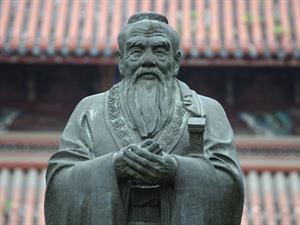PDF chapter test TRY NOW
Introduction:
Many civilisations like Mesopotamian, Egyptian, Chinese, and others emerged with unique practices and cultures that separated one from the other.
One such notable civilisation was the Indus Valley civilisation that flourished in the northern part of India, which brought trade and urbanisation to the Indian lands.
The \(6^{th}\) Century \(BC\) and the Social Order:
The period \(6^{th}\) century \(BC\) was considered one of the greatest periods that revived the world’s thoughts and culture. This period saw the emergence of various religions and cultures that shaped the people’s morality, which in turn helped them sustain their lives.
Some of the religions that arose during the \(6^{th}\) Century \(BC\) are given below.

Jainism and Buddhism challenged the existing Brahmin supremacy in India and established new religions named Buddhism and Jainism.
Similarly, around the world, Zoroastrianism in the Middle East and Confucianism in China brought the new wave of Intellectualism and shaped the thoughts and actions of people.
The Rise of Confucianism in China:
Confucius was a Chinese Social reformer and philosopher who was born in \(551\)BC in Shantung province of China. His real name was “Kung Futse”, he was also considered a great thinker who was well-versed in academics, music and philosophy.
Books of Confucius: The four books written by Confucius formed the basis of Confucianism philosophy. These books speak about “Doctrine of Mean, Mencius, Great Learning, and the Analects”.
Confucius laid great stress on the character of the individual rather than his intelligence. He firmly believed that wisdom is acquired from the family.
According to Confucius, only a disciplined individual with proper ideals from the family is considered the superior person.
Three Virtues: Confucius pronounced three virtues that have to be possessed by superior men, are “Courage, Goodwill and the Intelligence”.
He also expressed the importance of virtues by which he taught that the children must obey their parents and wife their husbands, but when there is a wrong ideal, it has to be opposed.
He also laid down five important principles that are necessary for human life.
Five Principles of Confucius:
1. Humaneness
2.Wisdom
3. Righteousness
4. Trustworthiness
5. Propriety
The Confucius philosophy empowered the Chinese people about their political rights and also clearly spelt out the government’s duty to the people. He also emphasised that the government is obliged to provide “Food and confidence to the people, Military equipment to the warriors”.

Confucius
Confucius also wrote five books which are later called the “Five classics of Confucius” .
1. The Book of Records: These are books written by Confucius which contains \(58\) chapters that speak about the ethics and regulation of human society. These books are considered the first books in Chinese history.
2. The Book of Odes: Also known as the book of Poetry, this book contains \(305\) songs that deal with principles of morality.
3. The Spring and Autumn Annals: This work deals with political morality that has to be exhibited by the rulers or the government.
4. The Book of Changes: This book speaks about metaphysics and the divine system of that time.
5. The Book of History: Speaks about the legends of early China and the happenings during their period.
